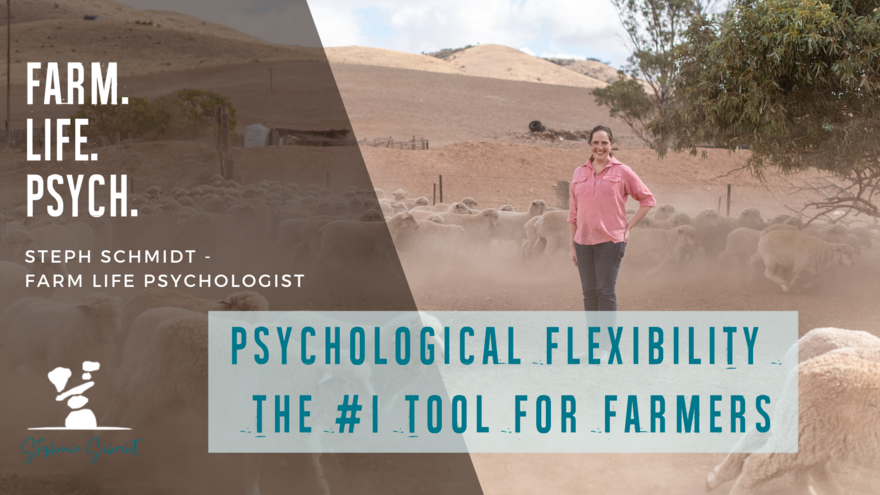What is Psychological Flexibility, and why is it the #1 tool every farmer needs?

What is Psychological Flexibility, and why is it the #1 tool every farmer needs?
Psychological Flexibility is described as “contacting the present moment fully as a conscious human being, and based on what the situation affords, changing or persisting in behaviours in the service of chosen values” (Hayes, 2013).
Okay – but what does that mean to Farmer Jane down the road?
In everyday language, psychological flexibility is being open and holding lightly to our thoughts, emotions and experiences, being aware of the present moment, and taking action based on our values - rather than being hijacked by those tricky thoughts and feelings.
Based on a recently published review of over 54,633 studies – the father of psychological flexibility, Steven Hayes, stated,
“Psychological Flexibility is the single most important skill for your mental health and emotional well-being”
(Hayes, 2022)
So why is psychological flexibility vital for farmers and the agricultural sector?
Uncertainty, unpredictability, workplace stress, financial pressure, loss of control, exhaustion, fatigue, excessive job demands, communication, relationship strain, decision making, adapting to change, substance use, and managing stress. These were just a couple of the challenges that came to mind when I think about our life on the farm and some areas where psychological flexibility can be beneficial. We know that the agricultural sector can be an incredibly rewarding space to work in. However, it can also be incredibly challenging. The three core skills of psychological flexibility (openness, awareness, and valued action) are learnable, teachable, and vital to agriculture's ongoing success and viability.
The Three Pillars of Psychological Flexibility
There are three core pillars to psychological flexibility: Openness (both emotionally and cognitively), present moment awareness (often described as mindfulness), and value-driven action.
Openness:
As humans, we are pain-averse, meaning we are wired to try to get away from painful or unpleasant things. While this makes sense in relation to physical pain and discomfort, when we try to avoid or run from emotional or mental pain – the problems can actually get worse. Building psychological flexibility includes learning how to relate differently to our inner world.
So, instead of getting hooked up by challenging thoughts and feelings or spending all of our energy trying to avoid and get away from that inner discomfort, we can learn to unhook from difficult thoughts and change how we relate to them.
One simple example of this is to start noticing your thoughts. Rather than identifying 100% with the thought or feeling (e.g., “I’m not good enough”, or “farming is too hard”, “I can’t handle this”) – we can change the relationship to those thoughts by adding “I’m having the thought that….”. (e.g., “I’m having the thought that I’m not good enough”, or “I’m having the thought that farming is too hard”).
The best way to experience this exercise is to play with it yourself. Take a challenging or tricky thought that you tend to get hooked on at times, and notice what happens when you add, “I’m having the thought that….”. People tend to notice that the power of the thought is taken away. You can see the thought at arms reach rather than stuck in your face.
We can use this same approach to be more open to difficult feelings. By naming our feelings, we can step out of the usual avoidance strategies we use as humans (e.g., get rid of discomfort or uncomfortable feelings with alcohol, distraction, or try to “think” our way out of them). Naming your feelings can be as simple as starting to notice “I feel anxious” or saying to yourself, “Here is anger” or “Here is uncertainty” as those feelings show up.
Again, the best way to do this is through practice – exploring how things might be different when you pause and notice your feelings rather than just getting hooked up by them.
Awareness:
Openness skills connect directly with Awareness skills. Mindfulness is one aspect of Awareness that has become increasingly popular throughout society – and for good reason. Mindfulness is beneficial across a whole range of areas. As a foundation, awareness of the present moment (or mindfulness) allows us to observe and notice what is happening non-judgementally. It importantly puts us back in the driver's seat. When we are aware of the present moment, we can step out of the stories in our mind about the past and the future and instead choose to act in this moment right now, based on what is most important to us.
A quick practice to build your awareness:
- Pause and Notice:
- Notice your 5 senses
- Notice your breathing
- Notice your feet on the ground
- Notice "the weather" inside your body (what you are feeling)
Valued-Action
The third and final pillar of psychological flexibility – valued action- is about knowing what is most important to you and choosing to take action based on your values rather than being hijacked by thoughts and feelings. To do this, we need to take the time to actually get in touch with what matters most.
To take the time to reflect on who and what matters, and more importantly, to identify who we want to be and how we want to show up in the world. Then, it is about starting to take small daily actions towards those values, turning them into daily habits of behaviour, which allows you to move towards those things in your life that give you meaning – even during stressful and difficult times.
A quick practice in Valued-Action:
1. Pull out your phone and scroll through your photos. What stands out to you in your photo reel? Who and what matters most?
2. After you've identified who and what matters most, write down ONE thing you can do this week to engage in that value.
What does this look like in action?
As a farmer, wife, mum (and human being), learning and strengthening my psychological flexibility have become the most essential skills in my toolbox.
For me, it is about creating space for regular daily practices – e.g., mindful breathing or just bringing awareness to my daily habits (having a shower with awareness); being more open and learning to skillfully relate to challenging feelings – anxiety, frustration, overwhelm, disappointment – they are all going to show up whether I want them there or not. Learning to hold those feelings lightly helps me to be able to move towards what matters.
Reminding myself “who and what matters most to me” and noticing what hooks me as I move towards what matters gives me space to take those steps – even when it is tough, even when it is hard. Moreover, when I do that, I get space to enjoy the little moments, be present with those who matter the most, and show up in the world as the person I truly want to be.
Please remember, these are skills - and require continued practice. Just like physical strength and flexibility, building your emotional and psychological strength and flexibility isn't a One and Done situation. We have to practice, and choose, and practice, and choose. Over. and Over. and Over again.
But it's worth it.
Take care of you,
Steph


0 comments
Leave a comment
Please log in or register to post a comment